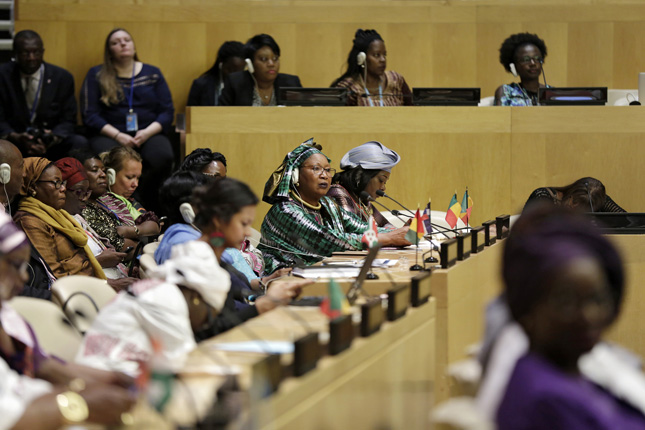-
To Realize the Demographic Dividend in Africa, Countries Must Fight Corruption
May 16, 2018 By Diana Warira
Today, African leaders agree that Africa has a great opportunity to reap economic benefits from strategic investments made in the continent’s current large youthful population. The “demographic dividend” is the accelerated economic growth that can result from improved reproductive health, a rapid decline in fertility, and the subsequent shift in population age structure. With more people in the labor force and fewer children to support, a country has a window of opportunity—but only if the right social and economic investments and policies are made in health, education, governance, and the economy.
To harness this dividend, African governments need to also invest in good governance and accountability. This year, the African Union’s theme is “Winning the Fight Against Corruption: A Sustainable Path to Africa’s Transformation,” an indication that African leaders are aware that corruption is a barrier to progress on the continent. However, this element is not receiving as much attention in demographic dividend conversations between experts and African policymakers.
Recognizing the Dividend, But Little Progress on Corruption
In the 2013 Sixth Joint African Union Commission and UNECA’s Annual Conference of the African Ministers of Finance, Planning, and Economic Development, policymakers and experts recognized the potential of the demographic dividend to transform Africa by reducing poverty and spurring economic growth. Since then, as a result of continuous engagements between population and development experts and policymakers over the years, several other milestones have been achieved, including the Addis Ababa Declaration on Population and Development in Africa Beyond 2014; the African Union Common African Position on the Post 2015 Development Agenda; and the Africa Agenda 2063– The Africa We Want. These milestones culminated into the 2017 African Union theme, where African leaders committed to investing in Africa’s large youthful population to drive development. We can now say that there is a continental consensus between policymakers and experts on the potential of the demographic dividend to transform Africa.
Despite this high-level interest, poor governance continues on much of the continent, including the loss of public funds meant to benefit citizens, weak accountability mechanisms, and poor coordination of management across various levels of government. These are challenges that countries have struggled with for decades. The tools for improving governance are in place, both at continental and country level. But why are we not progressing?
Some African Union member states have ascribed to the African Peer Review Mechanism, an instrument whose objective is to foster self-monitoring by governments in order to ensure the adoption of policies and standards of practice that enhance political and economic governance. Countries also acknowledge that without good governance they will not be able to achieve their medium- and long-term development aspirations. For instance, the Sessional Paper No. 10 of 2012 on Kenya Vision 2030 emphasizes the determination of the Kenyan government to be “…accountable, transparent, and results-oriented.” This is in addition to assuring that public service is well-governed and delivers services to the public at the highest quality. I could dig up several other documents, including Kenya’s Governance Strategy Paper of 2006, all illustrating the government’s commitment to good governance across all sectors. However, like several other African countries, Kenya’s governance indicators remain dismal. Despite being an economic powerhouse in the East African region, Kenya ranks among the most corrupt nations globally, recently placed at number 143 out of 180 countries in the 2017 Corruption Perceptions Index.
No Dividend With Poor Governance
In the context of demographic dividend research, good governance is viewed as a cross-cutting issue. This means that every sector critical for a demographic dividend—health, education, economic reforms, and job creation, has a governance component—as the government needs to ensure that for each of these sectors, the resources allocated for public service delivery are put into good use, the accountability mechanisms for public funds are robust, and corrupt officials standing in the way of progress are dealt with swiftly. Therefore, beyond making initial investments in family planning to facilitate fertility decline and a demographic transition, African governments must uphold good governance.
Kenya has had its fair share of scandals within public service in recent years, with the health and education sectors being the greatest casualties. In 2017, the health sector was brought to its knees when doctors and nurses went on strike (three months and five months respectively), resulting in several deaths in public hospitals. These strikes are largely attributed to poor allocation and management of resources for the human resource needs of the health and education sectors.
The current challenges facing these two sectors are just a small component in the iceberg of Kenya’s governance issues. The government needs to fill the existing holes in its public funding, which have resulted in gross inefficiencies across the health, education, and economic sectors. Not only do these inefficiencies contribute to low standards of living among Kenyans, but also to the loss of life.
The evidence from demographic dividend research shows that countries cannot reap economic benefits and steer their countries towards medium- and long-term development goals without paying attention to investments in health, education, economic reforms and job creation, and good governance. Therefore, by ignoring investments in good governance and accountability, governments are curtailing the progress of their countries in all facets.
Experts communicating demographic dividend research to policymakers should therefore not shy away from emphasizing this point. While policymakers agree that investments in the large youthful population are critical, these youth will not be healthy, and they will neither have access to quality education, nor will they be gainfully employed, if the status quo remains. African governments should have the political will to translate their commitments into action. With poor governance, there will be no dividend for Africa.
Diana Warira was a Wilson Center Southern Voices Network Scholar for Peacebuilding for the Spring 2018 term. She is a Communications Officer for the African Institute for Development Policy in Nairobi, Kenya, which is a member organization of the Southern Voices Network for Peacebuilding.
Sources: African Institute for Development Policy, African Union, Daily Nation, Demographic Dividend, The Lancet, Transparency International
Photo Credit: African Women Leaders Network, June 2017. Photo courtesy of the UN Women.
 A Publication of the Stimson Center.
A Publication of the Stimson Center.






